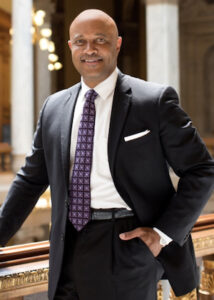
19 Apr 2023 Curtis Hill: Abusing Prosecutorial Power Is Nothing to Bragg About
‘Social justice warriors’ are a threat to us all
Do Black prosecutors see golden opportunities for payback to make up for the myriad injustices suffered by Black Americans throughout our nation’s history?
That is precisely the implication from political leftists as they offer giddy reactions to the 34-count indictment of former President Donald Trump announced by Manhattan District Attorney Alvin Bragg. “Now Trump will know what it’s like,” they proclaim in unison as they applaud Mr. Bragg for his “moral courage” to “pursue justice” against Trump.
You might say this indictment pertains solely to alleged falsified business records and has nothing to do with race. But the political left makes everything about race. That includes a lot of big-city “social justice” district attorneys — whose leftist tilt leaves true justice sliding off its foundations in “woke” jurisdictions across America. The subverters, with seemingly unlimited financial resources, are getting exactly what they paid for. They identify progressive, preferably Black prosecutor candidates whose collective work will promote a social justice agenda nationally and appeal to the so-called marginalized communities.
Thus begins the realignment of the criminal justice system in America. Sound sinister? It is. These new kinds of social justice prosecutors won’t be bound by the ordinary standards of prosecutorial discretion grounded in the Constitution. Oh, no! Instead, DAs like Mr. Bragg will unilaterally determine the desired “corrections” to the system and — using the unfettered authority of their offices — realign the power dynamic regardless of the moral, ethical and legal rightness of their intended outcomes.
In other words, they’ll charge whomever they want for whatever they want — or decline to charge whoever they want for whatever they want — according to whether it suits their agenda, regardless of the law. And this will all be OK because we’re making up for past wrongs. Now, after all, Mr. Trump will know what it’s like.
I remember my own experiences being a young deputy prosecutor who happened to be Black. I often got questions from others about why would I want to lock “my people” up. Or, they might ask, why don’t you practice criminal defense so you can help Black people instead of hurting them?
As I continued on my path to becoming one of the few Black Republican elected prosecutors in the nation, I always dismissed such criticisms as raw stupidity. I was not out to lock up Black people — or White people, for that matter — but rather to properly evaluate evidence and make decisions that were just and fair to all.
I was and am quite aware of the historical injustices faced by Blacks in America, including friends and members of my own family. It was not my job as a prosecutor, however, to use my position — and the power that came with it — to seek revenge. It was not my agenda to inflict injustice on people in other demographic categories just so they could experience the same unfair treatment that Blacks have experienced. Injustice is injustice — regardless of who’s facing it.
As a former prosecutor, I am particularly disturbed by Mr. Bragg‘s unbridled desire to get his target no matter what. He pursued a tawdry, 5-year-old tabloid story to concoct a case that had been rejected by his predecessor and declined by the Department of Justice. Mr. Bragg campaigned for office on a pledge to get Mr. Trump — so he wasn’t going to back down no matter how weak the case might be.
So, the nation watches as Mr. Bragg seeks the “justice” of locking up Mr. Trump for paying $130,000 to a porn actress in exchange for her agreement to keep her mouth shut and arranging for a friend to pay off another woman by buying rights to her story and then not publishing it. But those are not the crimes Mr. Bragg is alleging — because they are not necessarily crimes, per se.
The crime Mr. Bragg alleges is that Mr. Trump recorded his payments to his lawyer as “legal expenses” and not the preferred state of New York financial terminology of “hush money.” If only Mr. Trump would have written “hush money” in the memo section of his checks, none of this would be a problem, right?
While Mr. Bragg is bragging about his 34 repetitive counts, the reality is that he just has 34 examples illustrating the weakness of the same bad case. And he has refused to inform his target of the “other crimes” that Mr. Trump was allegedly covering up when he failed to write “hush money” on the checks. That’s not constitutional — but Mr. Bragg says that he doesn’t have to tell Mr. Trump the full charges. That’s the kind of power he ascribes to himself.
A popular refrain repeated extensively over the last few weeks is “No one is above the law.” I agree.
But no one is below the law, either. The criminal code in every state is established to clearly identify standards of conduct. The factual allegations, when compared against the appropriate code section, should be clear and concise as a matter of form, and they should matter in substance as a matter of justice.
And while today the target is Mr. Trump, make no mistake: Mr. Bragg and his social justice comrades have gotten a taste for the power to create their own legal standards out of thin air. They are just getting started.
Mr. Bragg has put himself and the justice system in far greater peril than he has Mr. Trump. And that’s nothing to brag about. We are better than that.
Curtis Hill is the former Indiana attorney general and a member of Project 21. This originally appeared in the Washington Times.




